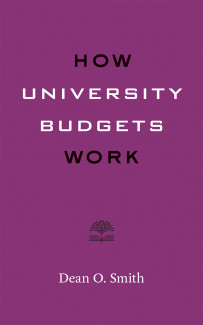
Johns Hopkins UniversityEst. 1876
America’s First Research University
How University Budgets Work: Q&A with author Dean O. Smith

Why did you decide to write How University Budgets Work?
I just finished writing a rigorous book on university finances that featured just one chapter on budgets. I welcomed the opportunity to expand this coverage in a book solely about university budgets. Moreover, because budgets are so important in university operations, I welcomed the opportunity to explain them in pragmatic terms, helping readers from various academic backgrounds feel comfortable with the fundamental aspects of budgets.
What were some of the most surprising things you learned while writing and researching the book?
I was surprised to learn how vigilantly the university budget office monitors expenditures to avert overspending. Looking back, I shouldn’t have been surprised—but I was—at how much of this oversight is performed in real time by the university’s enterprise accounting software. Also, I was surprised to learn how thoroughly the enrollment management and budget offices analyze demographic and economic data when forecasting tuition income for future budget years. Ultimately, however, the forecasts contain an element of inherent uncertainty that the budget office must accommodate.
What is new about How University Budgets Work that sets it apart from other books in the field?
Unlike other books on university budgets, this book explains how university budgets work from a practical approach. For the most part, the other books tend to be encyclopedic: they narrate facts and figures, but they don’t provide useful guidance for understanding how to work with budgets. How University Budgets Work gets “straight to the point” with sample budgets and best practices on how to construct, implement, and close a budget. And, unlike most other books on the topic, this book explains how to align a budget with the institution’s strategic plans.
Did you encounter any eye-opening statistics while writing your book?
An eye-opening concept, rather than a numerical statistic, caught my attention: the legal aspects of the budget. Prior to writing the book, I wasn’t sure what legal status budgets might have. I knew from experience that budgets convey implicit commitments. But, are they enforceable in the courts? Because of its potential ramifications, this was an important question to answer. So, I consulted several university lawyers and learned that budgets are not considered contracts and, therefore, are not enforceable in the courts. They are simply planning documents.

Does your book uncover or debunk any longstanding myths?
The book confirms the longstanding suspicion of many faculty members that universities have large reserves of money available for general use. As a common business practice in nonprofit organizations, these reserves usually comprise sufficient money to sustain university operations for two to six months. For most universities, that is a lot of money. But, as this book points out, these reserves are not created on a whim by the administration. Often, they are mandated by governing boards and state legislatures as a buffer against unforeseen large fluctuations in revenue or expenditures. As “rainy-day” funds, they play an important role in university finances.
What is the single most important fact revealed in How University Budgets Work and why is it significant?
The most important fact revealed in the book is the alignment of budgets with strategic plans. Strategic plans document institutional aspirations, identifying academic and operational priorities. Budgets assign resources to these priorities. This concept—the alignment of budgets and strategic plans—is significant, because it explains how money is allocated when preparing the budget. Because of this important linkage between strategic plans and budgets, I include a chapter on strategic planning in the book, illustrating how the alignment occurs.
How do you envision the lasting impact of your book?
As readers learn how university budgets work by reading this book, they will become more effective in their roles within the university. The quality of administration and shared governance will improve. As the book’s author, I would be very proud of this outcome.
What do you hope people will take away from reading How University Budgets Work?
I hope that readers will develop a comfortable understanding of university budgets: the rationale for strategic planning, underlying budget models, revenue allocations, control procedures, closing the books. And that they appreciate how the budget serves as a vehicle for change within the university.
Order How University Budgets Work – published on November 19, 2019 – at this link: https://jhupbooks.press.jhu.edu/title/how-university-budgets-work
Dean O. Smith has served in the higher administration of four major universities: the University of Wisconsin–Madison, Texas Tech University, the University of Alabama in Huntsville, and the University of Hawaii, where he is now professor emeritus. He is the author of How University Budgets Work, Managing the Research University, Understanding Authority in Higher Education, and University Finances: Accounting and Budgeting Principles for Higher Education.



